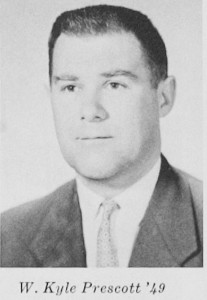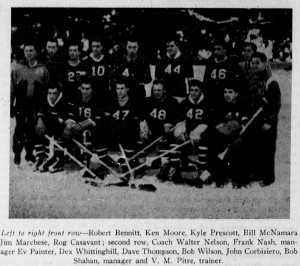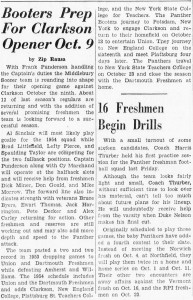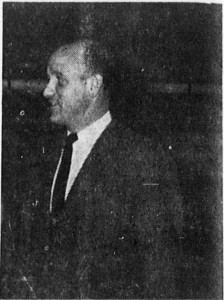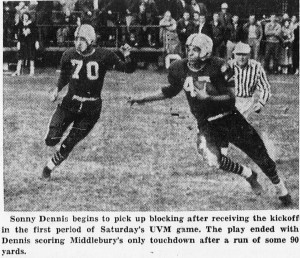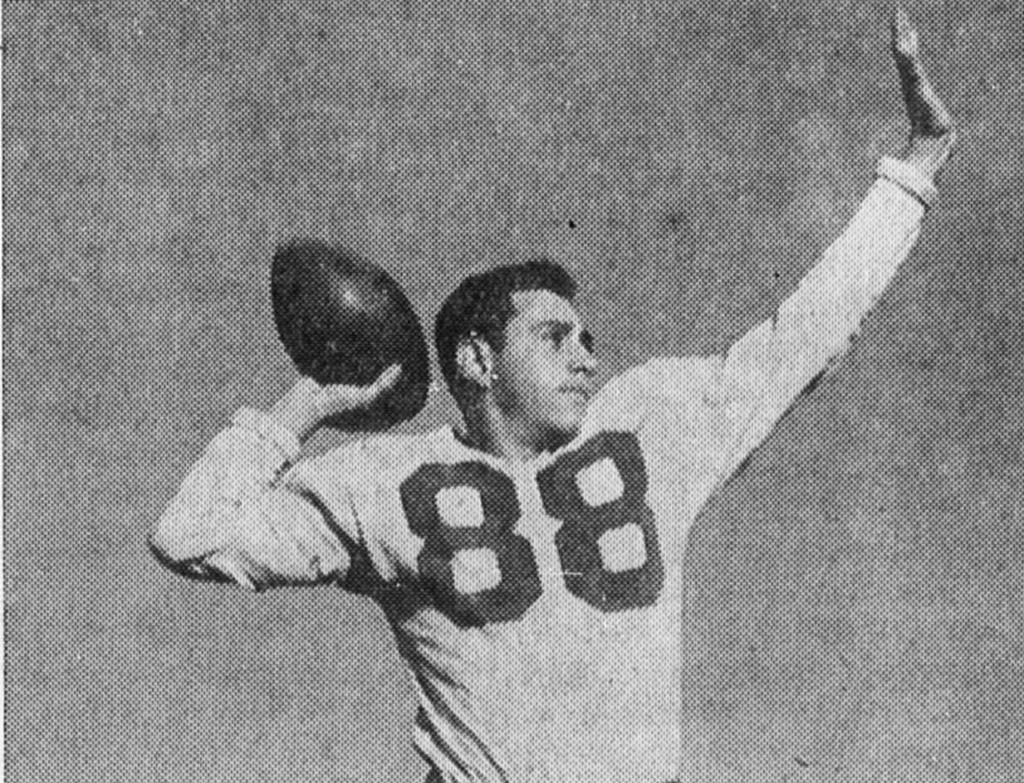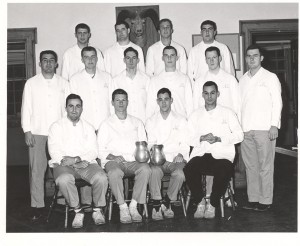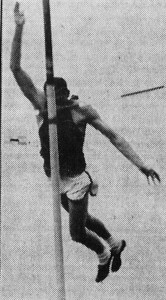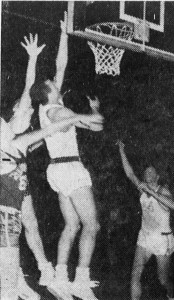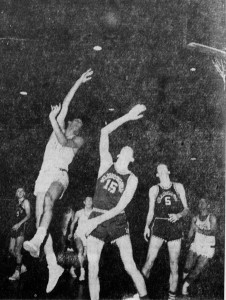What led from the transition from Bates to Middlebury?
At Bates I was the head athletic trainer and assistant basketball coach. I really wanted to get out of athletic training and the opportunity availed itself during the spring of ’77. I had gotten to take the Bates golf team to the NESCAC championship and Tom Lawson had taken the Middlebury golf team to the championship. And it had just been announced that he had been promoted to the Director of Athletics position and there was going to be an opening for an assistant soccer coach and assistant basketball coach. So in a true example of merely being in the right place at the right time I was able to chat with him, was very informally interviewed over a day-and-a-half period and was ultimately offered the position as the assistant soccer coach and assistant men’s basketball coach, which I accepted. And that started my career at Middlebury.
What were your impressions of Tom Lawson as a coach?
Tom was meticulously detailed, very system oriented — a very good coach. He was a very successful high school of both soccer and absketball and all of those traits were going to make him a very successful athletic director.
Greg Birsky said that during Lawson’s coaching tenure they would run sprints after practice, which stopped when you became the head coach. What was the difference?
That’s a hard question to answer. I was a much more freelanced, fast-break kind of coach, so I felt that most of the running that we would need to do occurred during the drills in practice. Running for running’s sake was not all that necessary if everyone was pushing themselves during the drills. Did everyone run as hard as they could have every time? Probably not. But to me it seemed like a better approach than putting guys on the line and running them at the end. That didn’t seem to accomplish a whole lot. I’d much rather have them running with the ball because that’s what they’ll be doing during the game.
Birsky said you were a great “practice coach.” What does that mean to you?
Well I’d like ot think that practice for any coach is their class room. That’s where you’re teaching the basic lessons … the games are just exams. So if you’re not doing your job in the classroom teaching the skills of the game or your philosophy, then you’re probably not doing everything you can to prepare your team to be as successful as you might like them to be.
What do you remember from your first return to Bates?
It was a very emotional game for the people at Bates and myself and my wife. They presented her with flowers — it was quite a showing — and then they held the ball on us right from the get-go. We had to battle to come back. We were down six or seven at halftime and we battled back and we were able to figure out a way to win it in the end, just because the guys stayed disciplined, bore down a bit defensively, made some big shots at the end and were able to get out of their with what I thought was a great win, considering they really did hold the ball. It was one thing I didn’t expect, but I thought we reacted very well to it.
What kind of players were Greg Birsky and Kevin Kelleher?
They were terrific players. Greg was as accomplished a point guard as you could ever hope to coach. He could score, he was great at directing the team, good assist man, knew the game extremely well. Kevin was the consummate scorer. Period. He could shoot the ball from the outside, he could take it inside, he could rebound , he was a tough competitor — a lot of fun to coach.
Greg Birsky said he wasn’t always the easiest guy to coach … is that fair?
Greg’s a little hard on himself. I didn’t find him that hard to coach. Because of the way he approached it, he did have a great field of knowledge. And when I coached I always wanted the players to speak up if they had something to say. Coaches can’t see everything; they can’t always know their players as well as they might like to think they know them. And the palyers themselves have a better insight into their teammates than their coaches. I thought Greg would have been a terrific coach if decided that’s what he wanted to do.
He said early in your coaching career there were a couple of Bob Knight moments with regard to your interactions with the officials. Was that your demeanor on the sideline, as a fiery coach?
It was early in my career — I guess I matured over a period of time. I think the particular episode that he might have been referring to was when I stepped in to coach the team for two games during Tom Lawson’s last year. And we were playing U-Mass Lowell, which was a Division II school at the time. And we were in the game much longer than we should have been. We were playing a box and one defense and we were running this guy off the screen. And I wasn’t questioning that we didn’t foul the guy, we fouled him, there’s no doubt about it. But the guy took two dribbles past the screen and buried the shot and they counted the goal. That’s when I came unglued. And I think I booted a chair into the stands as I recall, which cost me my first technical. I think there were some faculty members in attendance who didn’t think I should become the next coach because I was too emotional.
What about the injury Greg Birsky sustained his senior season?
He had a real significant back injury so either you had to play him off the bench and you knew you were going to leave him in the game, or you had to leave him in the game period. I had forgotten about that. As you know injuries are a part of the game, but it’s especially unfortunate when it happens at the point guard position because it’s so important in terms of directing the operation when the game is underway. And if the point guard gets hurt and you don’t have anyone to back him up, it’s hard to get things get going both offensively and defensively. You need someone with a good head on their shoulders, can communicate, understands the game — certainly qualities Birsky had.
How does your career look, more big picture now going from head coach to director of athletics to assistant coach?
First of all, Jeff giving me the opportunity to get involved in coaching … I guess I didn’t realize how much I missed coaching. I remember President McCardell saying, “I’ll let you coach one more year, but that’s it.” And so it didn’t make sense to just go one more year. IF that’s the way you feel, let’s cut the umbilical cord right now. There were a couple of guys involved in the NESCAC who were both Athletic Directors and basketball coaches. So I didn’t think it was impossible. But I knew it was probably going to affect both positions, so he was right to tell me that I shouldn’t do it. At the time the College was embarking on a major capital campaign, so it was the right thing for me to do as the Athletic Director at the time. In hindsight, knowing how much I love coaching, love teaching, love being with young people, I’m not sure I would make that step again, but hindsight is always 20/20. Even though my role with the team is relatively small — I work with the big kids for 15 minutes a day — I just love teaching the game and trying to help kids on an individual basis with a little prod here, a little poke there, a little slap on the back on the back here, a little kick in the rear end there if they need it because that’s what I think coaching is.
What’s the story of Warren, the team’s equipment manager?
Warren was a retired Vermonter who had gotten involved as an assistant equipment guy and he and I used to have conversations all the time. And his favorite team was the Boston Celtics, but he had never ever been able to see them play. When I had been coaching at BU and Bates prior to coming here, I had made some contacts, particularly with KC Jones. At the time KC was the coach of Brandeis and then subsequently moved on to the Celtics and their organization. So I contacted KC and said “I’ve got this old-time Vermont farmer, long-time Celtics fan, never been to a game … can you help me out with tickets?” He got me five tickets! Enough for me to take our three captains, Warren and myself down to a Celtics game. Another alum arranged a meal for us at a big-time restaurant across from the Garden. At the end of the game KC arranged for us to go down into the Celtics locker room and take pictures with Dave Cowens and KC Jones. That picture hung in Warren’s living room until he died. It was just a great way of helping an old-time guy who had worked hard all his life, never really had much to show for himself, but he was just such a great person that I wanted to honor him. It was a fairly simple thing to do.
What are some of the biggest wins that you remember looking back as a coach?
Any win over Williams was a big win. Beating St. Mike’s two years in a row… probably 1984ish, I’m guessing. I had spent a full winter chasing this kid from Rutland, Vermont, Jimmy McAfree. I was the only coach in the state recruiting him — I was at every one of his games — and was assuming that we had a pretty good shot of getting him … he was going to be admitted. I remember going to the state championship game up in Burlington: on one side of me was the St. Michael’s coach and on the other side was Jeff Brown the assistant coach at UVM. And Jimmy goes off on an unbelievable individual performance in the championship game. I’m rooting for him to foul out while everyone else is rooting for him to score more points. And I remember closing the program and saying to myself, “It’s been nice knowing you Jimmy.” Because I knew in my heart that he was going to be recruited by St. Mike’s and UVM. This was a Friday night and on Sunday night he calls me and thanks me for all that I had done and all the interest that I had shown, but that he had made a decisions and that he wanted a higher level of competition, which I could understand. And I’m making the assumption that he’s going to UVM. And then he tells me he’s going St. Mike’s. I almost dropped the phone on the floor. Jimmy! I don’t understand, but his dad was a St. Mike’s guy and was a judge in the state. I remember he came down here his freshman year and we beat them by six or seven, and then the next year we went up to play them on their floor and they take the lead with nine seconds to go in the game. We get the ball come down and call time out in front of our bench. Fain Hackney, who is now a judge on the Cape, buries a shot at the top of the key. We ran a play designed by Hubie Brown, worked to perfection. He buried the shot and we won the game at the buzzer.
Beating Williams twice in the same season was definitely a highlight. That was a little bit later. And then one of my last games coaching we beat a Williams team here that was ranked second in the country. I remember going around campus telling everybody that if they were going to celebrate with us they had to be at the game. We put something in play where we changed defenses on every possession — they didn’t know what we were playing. I just wanted to get in their heads and screw them up and we did a pretty good job of it. John Miletus hit a big shot. I remember distinctly we had to play Union in the last game of the year and we’re waiting for the bus up by McCullough and Ron Liebowitz comes driving up, gets out of the car, runs up to me and says, “You son of a gun, you called that win!” And I said, “Well I had to convince everybody else that we were going to win it if I was going to convince the team.” And it was really the only time in my coaching career when I was really obnoxious about it — and I was really obnoxious in the week leading up to that game because I really wanted our team to believe they could do it and they somehow found a way how to do it.
Is there anything else you’d like to add?
“I’m firmly convinced that if you’re playing a sport at a place like this it’s an extension of your the educational message. And your first mission is to teach.”

